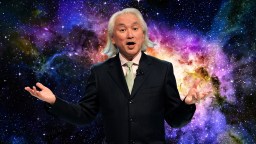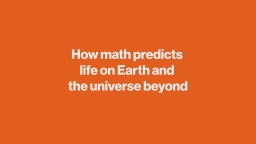string theory
Can one equation unite all of physics?
▸
6 min
—
with
How long should one wait until an idea like string theory, seductive as it may be, is deemed unrealistic?
Roger Penrose used mathematics to show black holes actually exist. Andrea Ghez and Reinhard Genzel helped uncover what lies at the center of our galaxy.
Grandfathers, take heart. You’ll survive the paradox that’s been gunning for you since the 1930s.
Math doesn’t suck. It is one of humanity’s greatest and most mysterious journeys.
▸
15 min
—
with
The outer edges of a black hole might be “fuzzy” instead of neat and smooth.
From talking about Schrödinger’s cat to nuking the South Pole, this decades-old interview shows why Kaku was born to be a science educator.
If philosophers don’t try to mesh their long-held views with new scientific insights, then we have a problem.
▸
5 min
—
with
New experiments look to the interplay between neutrons and magnetic fields to observe our universal reflection.
Cosmologists propose a groundbreaking model of the universe using string theory.
Eight-dimensional octonions may hold the clues to solve fundamental mysteries.
A new study may change the face of astrophysics.
A mind-bending paradox questions the nature of reality.












